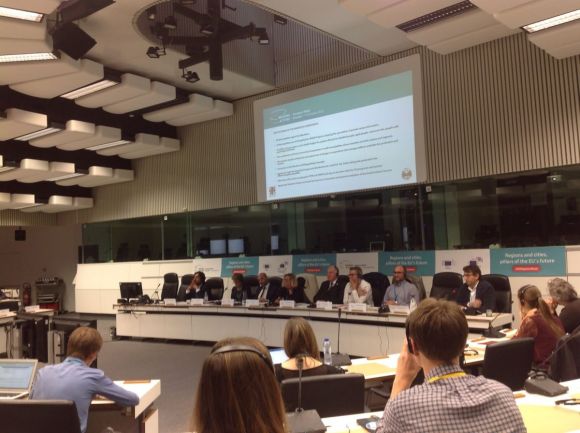
Migration brings various positive aspects. Therefore, it is important to help migrants and refugees to integrate into our societies by giving them proper education amongst other things.
This was the panel’s message during the ‘Migrant and Refugee Integration in Small Territories: A Win-Win Opportunity’ session on Thursday morning during the European Regions Week.
In his speech, the President of the European Committee of the Regions, Karl-Heinz Lambertz, confirmed that Europe is not the continent with the most refugees, but the issue is still huge. He reminded everyone that it is important for everyone to work together to be able to raise a solution.
Lambertz encouraged people to get together to push things forward. He mentioned that the main idea is to give these local representatives to integrate in a positive manner close to the ground.
Lambertz is hoping that every member state would shift from fear among the citizen to hope for the future. For this to happen, he remarked the fact that there has to be cooperation between all member states of the European Union.
Tomas Bocek (CEB Vice-Governor)
“Social exclusion risks to leave our countries with long lasting consequences, such as poverty.”
Tomas Bocek emphasized that it is no longer about human rights, but rather it goes deeper than that. He encouraged all countries to help migrants and refugees by providing etiquette education and health care, amongst other needs.
Claire Charbit (Head of Unit, Territorial Dialogues and Migration Centre for Entrepreneurship)
“The situation of migrants is always worse than any native born citizen.”
Claire Charbit recognizes the fact that migration comes with various challenges to the countries. Nonetheless, she said that it is really important to make them active in our community while creating a common space. Charbit said that building a social capital takes time but every country should create appropriate opportunities for everyone.
Guillaume Cros (Vice-President of the Regional Council)
“Migration issue is not dealt with correctly at EU level. I may even say that it is dealt with incompetently.”
Guillaume Cros said that everyone has to get on the same level to deal with this issue together as a unity. He said that there has to be a Europe wide solution to bring a new life into every community.
Cros concluded by saying that when there is a large scale of migrants in a rural area, it is usually a good thing and it works quite well. He added that huge economic difficulties would occur if the number of refugees do not keep entering the countries.
Miguel Motas Guzman (Murcia Regional Minister for Employment)
“We should help people who are going through very difficult situations to eventually live life as fully as possible.”
Miguel Motas Guzman stated that it is important to take into account the needs of every individual to have the best life, even if it requires to live in a foreigner country. He pushed forward the winner project of last year’s Regiostars to remind everyone of the importance of giving the opportunity for independent living.
Andros Karayiannis (Member of the European Committee of the Regions)
“We should promote open-minded and tolerance amongst all citizens.”
Andros Karayiannis said that every country should focus on saying no to discrimination, racism, radicalization, unintegration. He added that it is a nice feeling to live in a multicultural society as by welcoming migrants in our countries, it makes our lives more colorful.
Angelo Moretti (Caritas Benevento)
“We help out those in need and hope that more entities would join our mission.”
Angelo Moretti, who forms part of Caritas Benevento in Italy, said that through his work he has seen various refugees who went through a lot. He hopes that more people would integrate everyone in their society for a healthier living.
All those parts of the panel agreed that integration should always be part of society. Unfortunately, there are some challenges that are limiting integration. One of which is the obstacle of language and hence they suggested that migrants and refugees should be helped for their education to improve.
They also suggested that through education, they would be thought the local culture and eventually help them find a proper job.
Promoting positive ideas towards migration and fighting the rise of extreme political rights was also on top of the agenda. This way, everyone would have more independence.
Nonetheless, not everyone agrees with what was said. In fact, a man from the audience raised a particular question. He asked why are illegal immigrants needed in a country when there are a lot of citizens who are already unemployed.
The CEB Vice-Governor, Tomas Bocek responded by saying that whether a country wants to or not, they have to face illegal immigrants and deal with them. Bocek added that if we do not integrate them, there will be negative consequences.
Christine Mamo (Malta)



